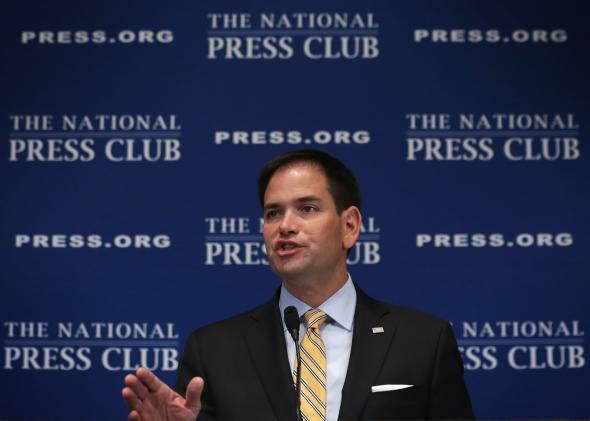Marco Rubio doesn’t care about deficits. Sure, the Republican Florida senator says he does, and—in his address to the National Press Club on Tuesday—he stressed his belief in fiscal responsibility. “[A]n agenda that cuts government spending and spurs economic growth is the single most important step toward stabilizing the three legs of the retirement stool,” he said. At the same time, his main proposal was a tax cut.
To help Americans save for retirement, Rubio wants to slash the Social Security payroll tax for all individuals who reach retirement age and expand the federal Thrift Savings Plan—along with its tax benefits—to Americans without an employer-sponsored 401(k). And this is on top of his general support for across-the-board tax cuts, including cuts to corporate taxes and taxes on investment income. In addition, as he said earlier this year, Rubio wants to reform anti-poverty programs by funding relocation programs—so individuals could find jobs in other areas—and a “federal wage enhancement” for qualifying low-wage jobs.
Put simply, after four years of pushing the austerity budgets of the Tea Party, Rubio—who is running for the Republican presidential nomination—is calling for low taxes and new spending, with little concern for the deficit.
As a message to the Republican base, which hates new spending, it’s a loser. But as a message for the general election, it’s perfect and proven. Before there was a Tea Party, there was George W. Bush, and as president he wasn’t overly concerned with squaring the circle of his priorities.
Bush’s playbook for policymaking was straightforward. Rhetorically, he would commit himself to reducing the debt and putting the United States on firm fiscal footing without “balancing the budget on the backs of the poor.” In practice, he ignored the budget altogether. Within three years of his election, the “fiscally conservative” George Bush—who during the 2000 campaign, said, “If Gore gets elected, the era of big government being over is over”—had charged tax cuts, wars, and the Medicare prescription drug benefit to the nation’s credit card, spending trillions without a dime in new revenue.
That was irresponsible. But politically, it worked. Republicans talk about deficit reduction, but what they want are tax cuts, and it’s incredibly difficult to reconcile the two. By definition, cutting taxes adds to the deficit. The only way to stop that is to also cut spending. But if like Bush you’ve committed to higher military spending and new programs for the elderly, your only choice is to slash everything else. In other words, you have to follow some version of Rep. Paul Ryan’s budget, which eviscerates the social safety net to pay for tax cuts and defense spending.
Of course, the Ryan budget is unpopular. Voters hate debt, but they love spending and oppose cuts to existing programs. In a national environment, there’s little to gain from a plan that destroys food stamps and unemployment insurance to pay for low taxes on dividends and capital gains.
And so, like Captain Kirk and the Kobayashi Maru, Bush changed the parameters. He would cut taxes, pass new programs, and forget about the deficit. No, nothing was paid for, but with $2 trillion in tax cuts, Republicans didn’t care.
All of that changed with the election of Barack Obama. Once again, the GOP raged against spending, only this time it adopted an extreme austerity agenda of spending caps and balanced budgets, even as the economy sputtered through a slow recovery, starved for stimulus and demand.
That worked well enough in the midterm elections. It was disastrous in 2012, when Democrats hammered the GOP with economic populism and denounced Mitt Romney as a heartless plutocrat. Now, with 2016 on the horizon—and as Democrats sharpen their populist message for this year’s elections—the Republican Party is trying to switch gears and soften its message.
So far, this has meant a lot of words about poverty—“I want to figure out a way for conservatives to come up with solutions to poverty. … I have to do this,” said Ryan during his “listening tour” of inner-city neighborhoods—without any policy changes. Which, while frustrating, is understandable. Unless they abandon the commitment to balanced budgets and deficit reduction, neither Ryan nor Sens. Rand Paul and Ted Cruz can offer reform as well as tax cuts.
By borrowing from Bush, Rubio offers a way forward. Republicans can have their tax cuts—and avoid the political peril of slashing the welfare state—if they give up on deficit reduction. Yes, it might anger the GOP base. But if debt complacency brings electoral victory—if President Rubio begins 2017 with a large tax cut and an expansion of the earned income tax credit—the base will manage, more pleased by a Republican president than angered by new deficits.
In other words, Republicans will thrive—and avoid the policy traps of the Obama years—if they discover, again, that “Reagan proved that deficits don’t matter.”
